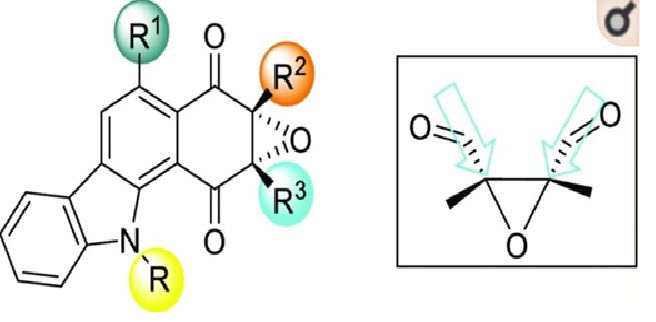Indian researchers have identified a protein pathway in an antibiotic-resistant bacterial strain called Staphylococcus aureus (S. aureus) and also a new molecule that can target this pathway.

This may help develop new antibacterial drugs in future.
The new molecule - indole based quinone epoxide (IND-QE) - has been developed by scientists at the CSIR-Central Drug Research Institute (CDRI), Lucknow and Indian Institute of Science Education and Research (IISER), Pune. This molecule can cross the bacterial cell barriers and disrupt the functioning of MarR proteins which are essential for the growth and survival of S. aureus bacteria.
Development of new antibiotics is a major challenge, given the increasing bacterial resistance. New antibiotics are usually based on natural products such as fungal or plant extracts, or from large chemical libraries, which are a series of stored chemicals. The researchers have selected a relatively less-explored process of antibiotic discovery.
"New antibiotics are usually based on natural products such as fungal or plant extracts, or from large chemical libraries, which are a series of stored chemicals. "
“A novel set of proteins (MarR) has been identified in S. aureus that could be targeted by antibacterial agents in order to tackle severe infections. This has led to the inhibition of extremely drug-resistant VRSA bacteria.”, said Dr. Harinath Chakrapani, a researcher at IISER, Pune.
The study results have been published in Journal of Medicinal Chemistry. IND-QE were synthesized at IISER Pune, while researchers at CSIR-CDRI screened the compounds against a panel of pathogens. It was again followed by the experiments at IISER Pune to identify and validate the protein targets of these compounds.
S. aureus is commonly found on human skin and mucosal membranes. if allowed to enter the bloodstream or internal tissues, it can cause serious infections such as endocarditis (heart valve infection leading to heart failure or stroke), osteomyelitis (bone infection) or pneumonia etc. It is an infection causing bacteria which can readily become resistant to antibiotics. The MarR protein found in bacteria is essential for its growth and survival which can be destroyed by IND-QE molecule.
Apart from Dr. Harinath Chakrapani, the researchers included Dr. Sidharth Chopra from CSIR-CDRI, Lucknow and Dr. Isha Soni, Dr. Siddhesh S. Kamat, Amogh Kulkarni, Dr. Dhanashree S. Kelkar, Dr. Allimuthu T. Dharmaraja, Rathinam K. Sankar, Gaurav Beniwal, Abinaya Rajendran and Sharvari from IISER Pune.
- India Science Wire













